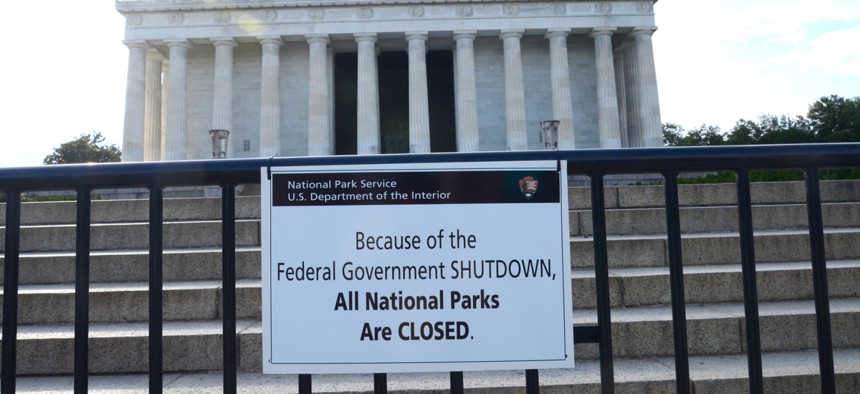Lawsuit Against Working During Shutdowns Presents a Potential Catch-22

TJ Brown/Shutterstick.com
A federal judge ruled it would be too disruptive to stop agencies from forcing employees to work without pay during a lapse in appropriations, but the Trump administration on Wednesday argued the case is now moot because government is open.
Is it possible for a lawsuit challenging the federal government’s practice requiring some agency employees to work without pay during a government shutdown ever to receive a full hearing?
That’s the question facing U.S. District Judge Richard Leon, who on Wednesday heard arguments about whether to dismiss a lawsuit filed by the National Treasury Employees Union and two federal workers alleging that during the 35-day partial government shutdown earlier this year, employees required to work through the lapse were denied their constitutional rights. The suit also accuses the Trump administration of violating the Anti-Deficiency Act, which prevents agencies from spending money in excess of what lawmakers have appropriated.
In January, NTEU and a separate group of federal workers filed the legal challenges, which argue that requiring federal employees to work without pay violates the Fifth and 13th amendments of the U.S. Constitution, and that the Trump administration’s efforts to make the last shutdown “as painless as possible” violated appropriations law. Those efforts included recalling more than 30,000 Internal Revenue Service employees to process tax returns.
While the shutdown continued, Leon declined to issue a temporary restraining order barring agencies from forcing employees to work without pay, citing the potential for “chaos.” After the government reopened in late January, the union and employees signaled they wished to continue with their lawsuit, but the Trump administration said that with the government open, the case became moot.
NTEU has argued that the case should be allowed to proceed because it falls under a legal exception to moot issues called “capable of repetition, yet evading review.” This exception exists for plaintiffs for whom a legal injury is likely to reoccur, but for too short of a period of time for the court to meaningfully consider their case.
Justice Department lawyer Daniel Schwei on Wednesday argued that it is “entirely speculative” that the plaintiffs in this case would find themselves in a situation close enough to the 35-day partial government shutdown to qualify for the “capable of repetition, yet evading review” standard. He said that to meet that burden, NTEU must meet a long “chain of contingencies.”
“They must show that there will be a future lapse in appropriations, that the lapse will affect the same agencies, and that those agencies will respond in the same way,” Schwei said. “And they cannot, because there could be a different governmental framework [regarding who is recalled to work], different funding, and then the plaintiffs would need to have the exact same job functions that they had in January in order to be affected to the same extent and in the same way.”
Schwei also argued that although NTEU has tens of thousands of members across the federal government, it must prove that the exact union members named in the original lawsuit would be harmed in the same way in a future shutdown.
NTEU attorney Paras Shah rejected those arguments, and called the “chain of contingencies” logic “untenable.” All the union needs to prove is that the “legal injuries” to its membership—the constitutional and Anti-Deficiency Act violations—are likely to reoccur, he said.
“By the very nature of NTEU’s membership across 33 different federal agencies, when there is another lapse in appropriations, at least one member will be forced to work and the injury will reoccur,” Shah said. “[We] are now 16 days from another potential shutdown, and the IRS sent us its new [shutdown] contingency plan for fiscal 2020, and it said that if it happens during tax season, we’ll be doing the same thing again and recalling 34,000 employees . . . to process tax returns.”
Shah also argued that with the Office of Management and Budget’s recent guidance to agencies telling them that they can ignore Government Accountability Office rulings regarding Anti-Deficiency Act violations, this court case may mark the only meaningful review of the administration’s spending.
“The upshot is that the IRS believes it can get away with this, even though the [Government Accountability Office] endorsed our view that what the agency did was illegal, and it shows that unless something happens, this will reoccur,” Shah said. “The executive branch, absent judicial intervention, says it can just police itself, which is anathema to the ADA, which was created specifically to rein in the executive branch.”
Leon said he would allow all parties to append their arguments in writing, provided those additions pertain to an argument made by the other side during the hearing. The possibility that he would issue a decision before the Dec. 20 funding deadline for another shutdown is remote, however.
“You’d be lucky to get a decision in January,” Leon said.
Michael Kator, an attorney for the two other federal employees in the lawsuit, said that given Leon’s previous ruling against a temporary restraining order, ruling that the case is moot would shut down all legal review of how the government operates during a shutdown.
“The claims raised in this case are not reviewable during a shutdown, because to do so would be too disruptive,” Kator said. “But there are only two times to review them—during a shutdown, and not during a shutdown—and the government says you can’t do it not during a shutdown because it would be speculative. Well, if you can’t review them now, you can’t review them at all.”
NEXT STORY: OTA revival hits a wall






